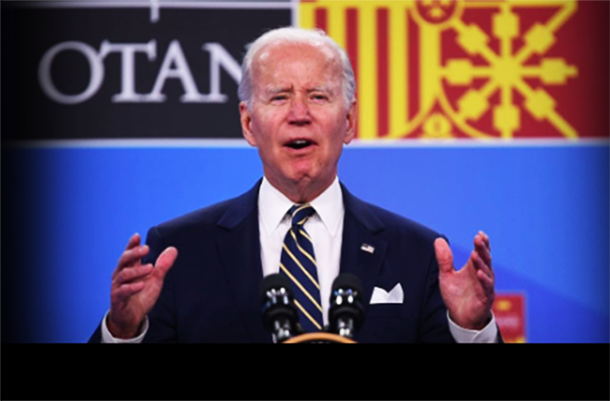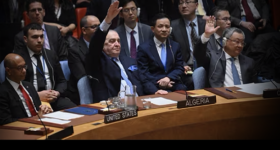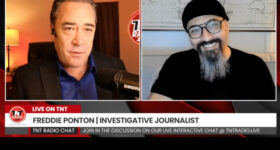Washington and NATO’s hubris has led western powers into a familiar trap – born out of two-dimensional foreign policy false bravado. Hence, America’s days as the primary player in Europe will close fast without a radical policy shift on Ukraine.

Brandon J Weichert from Asia Times writes…
“We’re going to bleed the Russians in the field!” was what one senior US Air Force official proudly claimed at an event I was speaking at last year.
It made sense. At the time, Russia had illegally invaded its independent neighbor, Ukraine, and the world was reeling from the shock of that event.
Of course, I had reservations about this claim.
After all, Russia was a nuclear great power in possession of the largest nuclear weapons arsenal in the world and they were invading a nation right on their border whereas the Americans were an ocean and a continent away—with other strategic concerns to contend with in the Middle East and Asia.
Playing Risk while drunk
For too long Washington has refused to think strategically about some of the major foreign policy issues of our time. In the rare instance where Washington’s policymakers do think strategically, the strategies they concoct seem less like realistic attempts at applying state power and more like they were conceived over a game of Risk while under the heavy influence of alcohol.
Such is the case with the current American preoccupation in Ukraine.
The Russians have invaded Ukraine. They’ve committed their entire society to the war. In the words of popular geopolitical analyst Peter Zeihan, this is “Russia’s last war.” Their society will not survive beyond the decade and Russia’s economy and political system will collapse because Russian strongman Vladimir Putin has overstretched in Ukraine.
All these statements may be true. Washington’s leadership has decided to test the limits of these assumptions by throwing everything into supporting non-NATO member Ukraine – even if it risks another world war.
What if things don’t go as planned? In war, of course, plans rarely survive first contact with the enemy.
The reasoning in Washington goes like this: for the “low cost” of Ukrainian lives and American taxpayer dollars, the West can end Putin’s strategic threat to the United States and its NATO partners.
Throw in some generous rhetoric of saving democracy and accusing any skeptics of the plan of being new Neville Chamberlains and you’ve got yourselves a winning dynamic. Besides, no Americans are dying. It’s not like Iraq or Afghanistan. This is a postmodern, “clean” great power war—and the Russians can do nothing to stop us.
This is the thinking. And, my friends, I’m here to tell you this is the same kind of two-dimensional analysis that got us mired in the failed Middle East wars of the last 20 years. While there may not (yet) be large US armies in Ukraine, the fact remains that the same kind of wishful thinking that got us stuck in Iraq has now ensnared the United States in an unwinnable war in Ukraine.
Think about it: we’re told that Volodymyr Zelensky, the Ukrainian leader, is Winston Churchill. Certainly, Zelensky is doing his best to save his nation and that is an admirable act. Despite his good press in the West, however, he’s less Churchill and more Ahmed Chalabi.
Our brand is failure
For those who need reminding, Chalabi was a corrupt, Iranian-backed Iraqi exile who dreamed of replacing Saddam Hussein in a post-invasion Iraq. He and his fellow Iraqi exiles connived the gullible neoconservatives who surrounded former president George W Bush into invading Iraq based on less than reliable intelligence.
After toppling Saddam Hussein, though, the plan went off the rails. Chalabi’s group, the Iraqi National Congress (INC) proved itself incapable of garnering popular support from the Iraqi people in a post-Saddam Iraq or of being a reliable partner to the Americans in Iraq.
But, boy, did the so-called strategy that Washington’s geniuses craft sound amazing on paper!
Before the invasion of Iraq in 2003, the Americans believed they would handily rid themselves of the persistent nuisance that Saddam Hussein had posed our country–because he was, according to the power-hungry exiles, building nuclear bombs and sharing that capability with al Qaeda—and then plant US military forces in the center of the Middle East to “stabilize” the entire region.
Meanwhile, the Americans would install a pro-American democratic regime under the control of Chalabi and would recoup whatever economic losses were incurred from the invasion by exploiting Iraq’s bountiful oil wealth. Plus, the Americans would insert themselves in the heart of the global oil trade by capturing Iraq’s magnificent oil supplies.
Perfect plan; not-so-perfect results. Democracy did not arise in Iraq. The oil wealth was not used to recoup America’s financial losses. Today, the Americans are out of Iraq and no longer sit atop the strategic oil flows there.
But, hey, it made for a great white paper in 2002.
Far from stabilizing the region, of course, America’s insertion of forces permanently into the region turned the resource-rich area into a hotbed of anti-Americanism. The US intervention exacerbated the Islamist threat posed to the US, too.
Today, Islamic extremist groups have proliferated beyond Afghanistan to just about every part of the Greater Middle East while at the same time the overthrow of Saddam Hussein has created a power vacuum that anti-American Iran is filling.
Here we are coming up on the twentieth anniversary of the US invasion of Iraq and the Washington foreign policy establishment has made the identical mistake that it had made back then—only this time in Ukraine, against a major nuclear power, Russia.
We committed ourselves to a plan that had no bearing on reality and then we told ourselves it’ll work out, even when it clearly wasn’t going to go as advertised.
We broke NATO, not Russia
Now with news breaking from the controversial investigative journalist, Seymour Hersh, that last September the Nordstream pipeline connecting bountiful and cheap Russian natural gas to Europe via Germany may have been sabotaged by the United States, an entirely new element of this slow-rolling disaster in Europe unfolds.
Washington told the world it was supporting Ukraine “to preserve” NATO (despite the fact that Ukraine was not a member of NATO). Yet, to keep Germany—a major NATO member—on-side in the Russian-Ukraine war, Washington supposedly conducted a covert attack on Germany’s critical civilian infrastructure that will have lasting, negative consequences for the German economy.
With this news now in the open, how does Washington think the German people will react?
There is in Germany today a large–and growing–anti-NATO and pro-Russian Far Right and Far Left. This news, combined with the terrible economic conditions that the war has brought on, will likely lead to the end of the pro-NATO government there and the rise of a government that will weaken NATO more than America’s feckless behavior already has.
As this happens, Russia continues plodding along in Ukraine, bleeding that country dry of its blood and the US taxpayer of their treasure. All that America’s intervention in Ukraine has thus far achieved is to totally militate Russia against Ukraine and the West–meaning that no deal to save the Ukrainians will be made anytime soon…
Continue this story at Asia Times
READ MORE UKRAINE NEWS AT: 21st Century Wire Ukraine Files
ALSO JOIN OUR TELEGRAM CHANNEL
SUPPORT OUR INDEPENDENT MEDIA PLATFORM – BECOME A MEMBER @21WIRE.TV
















